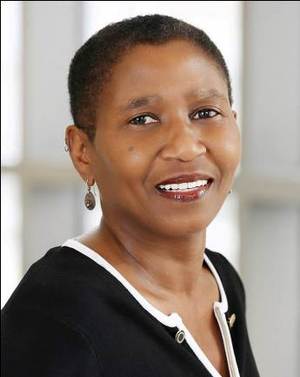
By Andrew Cohen
Michele Roberts ’80, recently named executive director of the National Basketball Players Association (NBPA), is the first woman to lead a major pro sports union in the United States. As often happens with golden opportunities, she had no idea that hers was right around the corner.
Roberts had already made it, after all, winning a slew of high-profile cases and awards for her litigating prowess. But one night last year, while watching ESPN, Roberts saw an NBA player interview soon after Billy Hunter’s unceremonious dismissal as head of the players’ union.
“The player was asked if the union had been damaged beyond repair,” Roberts recalled. “His response was a powerful ‘no’, and that the players intended to take their union back and make it stronger than ever. His passion touched me, and I remember thinking, ‘Wow, that would be an exciting job.’” She looked into the position, conveyed her interest, was contacted by the union’s search committee, and now holds one of the most powerful legal jobs in all of sports.
Roberts harbors no delusions about the intense media attention her union—and its members—receive. She also knows league owners got the best of the players during the NBA’s last collective bargaining agreement in 2011. The players’ share of basketball-related income fell from 57 percent to 50 percent, maximum guaranteed contracts were shortened, and stiffer penalties were levied on teams that exceeded the salary cap.
Hunter, who had led the union since 1996, was fired in February 2013 after an investigation revealed questionable business practices. Attorney Ron Klempner served as interim executive director while the NBPA conducted a search for a full-time replacement.
“I was intrigued by how little infrastructure the union had,” Roberts said. “There was no management team. This isn’t a mom and pop shop, and it can’t be run by a lone superhero. You need a management team with a variety of skills sets, which is why we’re putting together what I’m calling a team of gladiators that will help empower our players.”
Netting the players’ respect
Those players were reportedly impressed by Roberts’ track record. After graduating from Berkeley Law, she spent eight years as a successful public defender in Washington, D.C. and became chief of her office’s trial division. Three of her acquitted clients named children after her.
Roberts moved to private practice at Akin Gump, and stoked her reputation for making inventive arguments and connecting with juries. In 2002, Washingtonian magazine proclaimed her “the finest pure trial lawyer in Washington—magic with juries, loved by judges, feared by opposing counsel.” Chambers USA named her Business Trial Lawyer of the Year in 2011, the same year she joined the litigation group at Skadden Arps.
Roberts gives Berkeley Law ample credit for her career success, saying the school taught her “not to be paralyzed by a problem, even in the face of precedent, and to search for innovative ways to solve something. It’s a law school that doesn’t accept easy answers, and instead encourages thinking creatively and exhausting alternatives.”
While Roberts’ resumé made her a strong executive director candidate, something more personal resonated with NBA players: her background. Like many of them, Roberts grew up in a tough, low-income area—a South Bronx housing project from which some of her older brother’s friends went to jail.
“I’m not a man, I’m not in my 20s, and I have no basketball skills whatsoever,” Roberts said. “But, many of these players came through some fairly tough times to make it, and they know I did too. I think my upbringing struck a chord with them, and allowed us to begin creating a relationship of trust. I’ve received an unbelievable outpouring of support from the players, and I’m driven to affirm their faith in me.”
As for making history as the first woman to lead a pro sports union in the U.S., Roberts feels no added pressure from her pioneer status.
“I stopped many years ago worrying about carrying around an extra burden of being an African American woman in a mostly white male corporate world,” she said. “Look, I’ve certainly been inspired by women in my life, and to the extent I can inspire women and girls, that’s great. But I’d want to be the best executive director in the history of the union regardless.”